| Comparison Criteria | Powder Detergent | Liquid Detergent | Laundry Detergent Pods |
| Dissolution in water | Good In Warm Water | Excellent in all temperatures | Excellent in all temperatures |
| Stain Removal | Excellent for Heavily Soiled and General Stains | Excellent for Pre-treatment of Specific Stains | Good All-rounder |
| Measurement and Use | Needs Accurate Measuring and can be messy | Easy to measure and pour | Pre-measure, no need for measuring |
| Environmental Impact | Cardboard Packaging, Biodegradable Options Available | Plastic packaging contributes to plastic waste | Plastic packaging contributes to plastic waste |
| Suitability for Specific Needs | Good for Laundry Needs | Vaersatile for various laundry needs | Convenient for consistent load sizes and offers easy portability |
| Cost | More Economical | More expensive per load | Can be more expensive than powder and also liquid in some cases |
Choosing the right laundry detergent is crucial for effectively washing dirty laundry and caring for your clothes.
The right detergent ensures that your shirt or t-shirt comes out clean, fresh, and intact.
In this article, we will explore and compare the three main types of detergents i.e., washing powder, liquid detergent, and laundry detergent pod to help you make an informed decision.
By understanding the chemistry behind these cleaning products, you’ll be better equipped to tackle soiled clothes and make your laundry routine smoother.
So, without wasting any time, let’s dive right into the nitty gritty of washing detergents.
Table of Contents
Factors to Consider before opting for a laundry detergent

Cleaning Power
Evaluate the cleaning power of your laundry detergent i.e., a quality cleaning agent should effectively remove stains and dirt.
While looking to buy look for a detergent that includes enzymes like subtilisin, amylase, mannanase, and pectate lyase as they are vital in the stain-removal process.
Fabric Compatibility
Fabric compatibility is crucial, especially for sensitive items.
Look for detergents with surfactants, both anionic and non-ionic, as they are key for effective cleaning.
That being said, choose “gentle” or “delicate” detergents for clothes that require special washing care.
Water Temperature
Check if the detergent that you are using is optimized for cold water wash, as not all detergents are made the same.
If the detergent is suitable for cold water washing, consider the usual water temperature for washing.
This is because some detergents, that claim to be suitable for cold wash often come with builders to soften water, meaning they are optimized for cold water washing.
Cleansing Power and Fabric Protection
Assess the detergent’s cleansing power and its ability to offer fabric protection to prolong your clothes’ lifespan.
The only way to find the efficacy of the detergent is to either read the reviews or get a sample and test it in an inconspicuous area first.
Scent Preferences
While secondary, your washing preferences regarding scent are still important.
Choose based on your preference for perfumed or fragrance-free options, considering any sensitivities or allergies.
Eco-Friendly Options
If eco-friendly options appeal to you, seek biodegradable detergents with minimal environmental impact.
Brands like Seventh Generation and Biokleen are eco-conscious choices.
Machine Type and Size
Consider your laundry machine type, size, and detergent suitability.
High-efficiency machines may necessitate specific detergents, with dosage varying based on machine capacity.
Also, some may require powdered detergent with specific formulations or simply advise using liquid detergents.
Price and Brand Comparison
Price is a pragmatic factor, therefore, you just compare various laundry detergent brands like Tide, Gain, Persil, and Ariel to find a budget-friendly option that meets your laundry needs.
Skin Sensitivities and Consumer Preferences
Account for skin sensitivities and individual laundry detergent consumer preferences, paying attention to laundry detergent ingredients such as dyes, additives, and fabric softeners.
By carefully considering these factors, you can select a detergent that effectively cleans soiled clothes and aligns with your values and preferences.
Powder vs. Liquid vs. Pods
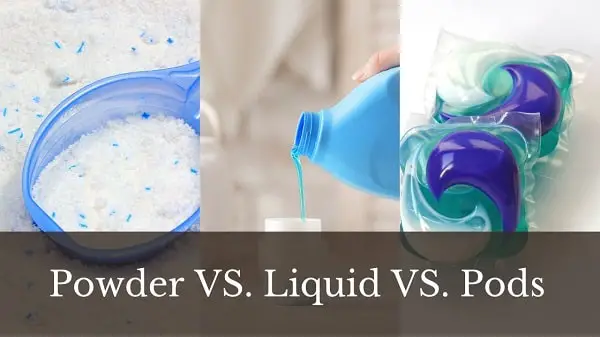
When it comes to laundry detergents, there are three main types that dominate the market i.e., powder, liquid, and pods.
Each form presents unique characteristics, with distinct advantages and disadvantages.
In this section, we will go through the specifics of each type, shedding light on their pros and cons to aid you in making an informed decision.
Powder Laundry Detergent
Pros of Using Powder Detergent
Powder laundry detergent stands out for several reasons.
The cost-effectiveness of powdered detergent is what makes it stand out, it is typically 20-30% less expensive per load compared to its counterparts.
Furthermore, it proves to be more effective at removing certain types of stains, such as mud and dirt, making it suitable for heavily soiled clothes.
Additionally, powder detergent often comes in more eco-friendly packaging, contributing to environmental conservation.
Another handy feature is its utility as a spot treatment for stains.
Cons of Powdered Detergent
Difficulty Dissolving in Cold Water
Powder detergent, a traditional cleaning agent, can pose challenges in dissolving in cold water, impacting its efficacy in washing dirty laundry.
The chemistry of surfactants and enzymes like subtilisin and amylase in the detergent plays a crucial role in this.
This limitation means it may not be as effective as liquid detergent in removing tough stains and oil stains from soiled clothes such as shirts and t-shirts at lower temperatures.
Need for Careful Storage
Washing powder contains biological components, fragrances, and dyes, necessitating careful storage to preserve these additives and maintain laundry detergent safety.
Improper storage can lead to the degradation of these elements, affecting the laundry detergent composition and, subsequently, its performance in cleaning and imparting perfume to clothes.
Messiness in Measurement and Pouring
The process of measuring and pouring washing powder can be cumbersome and messy compared to the convenience of detergent pods or laundry capsules.
This could result in wastage and additional cleanup time, which is especially inconvenient in busy Laundromats or while using home laundry machines.
Residual Issues
One common issue with powder detergent is the potential residue left on clothes and in the washing machine.
This not only affects the cleanliness of the laundry but also raises concerns about plastic waste and chemicals, especially for consumers inclined towards eco-friendly products and brands like Seventh Generation and Biokleen.
Effectiveness in Cold Water
Lastly, while powder detergent is known for its cost-effectiveness and ability to clean muddy clothes, it may not be as adept in cold water as its liquid-form counterparts.
This may affect laundry detergent consumer preferences, and necessitates consideration of various laundry detergent brands and types, such as Tide, Persil, and Ariel, based on specific laundry needs and soil level.
Best Use Cases for Powder Detergent
Powder detergents work well when cleaning heavily soiled items.
Experts often recommend the use of powder detergents when dealing with challenging stains and dirt, particularly mud and grass stains, on garments such as workwear, sports uniforms, and children’s play clothes.
The granular texture of powder detergent allows it to be especially effective in lifting and removing dirt from fabric fibers, making it a preferable choice for cleaning heavily soiled items.
Moreover, powder detergents are favorable for households with hard water, as they usually contain builders that help soften water, enhancing the detergent’s cleaning capabilities.
As such, for environments where water hardness is a concern, using a powder detergent can significantly improve laundry outcomes.
Tips for Using Powder Detergent
Water Temperature
Ask any experts and they will recommend using warm water to ensure the powder detergent dissolves completely.
While powder detergent can be effective in cold water, using warm water almost guarantees no residues are left behind on the clothes or inside the washing machine.
Measuring Guidelines
Accurate measurement is crucial as using too much detergent can lead to residues, while too little can result in less-than-optimal cleaning.
Sticking to the guidelines provided on the product packaging ensures the right detergent-to-water ratio.
Checking Ingredients
Examining the ingredients list on the detergent packaging is extremely important, especially if you are looking for safety.
Those with specific cleaning needs or skin sensitivities should look for detergents with the appropriate enzymes and avoid potentially irritating additives.
For instance, detergents with enzymes like subtilisin, amylase, and mannanase can enhance stain removal, while those with fragrances or dyes might irritate sensitive skin.
Pre-Treatment
For stubborn stains, using powder detergent as a pre-treatment can be effective.
Applying a small amount of detergent directly onto the stain and gently rubbing it in before washing can enhance stain removal.
Storage
Store the powder detergent in a cool, dry place and ensure the container is sealed properly to maintain its efficacy and prevent moisture absorption.
Liquid Laundry Detergent
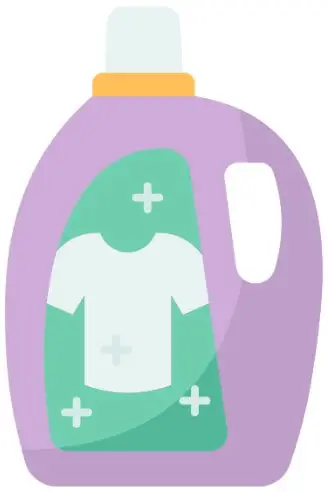
Pros of Using Liquid Detergent
Liquid detergents often contain zwitterionic surfactants, which are renowned for their ability to effectively clean in varying water temperatures and exhibit mildness, making them suitable for individuals with sensitive skin.
Here are the pros or advantages of using a liquid cleaning solution.
Ease of Use and Versatility
Liquid detergent stands out for its ease of use, it’s simpler to measure and pour compared to washing powder.
The liquid form allows for versatile application, making it a popular cleaning agent for various laundry needs.
Dissolves Easily in Cold Water
One of the notable advantages of liquid detergent is its ability to dissolve more efficiently in cold water.
This characteristic is particularly beneficial for energy conservation, as it enables washing dirty laundry with cold water, reducing the reliance on energy-intensive hot water cycles.
Less Residue on Clothes and Machines
Liquid detergent is less likely to leave residue on clothes and in laundry machines, ensuring cleaner laundry and maintaining the efficiency of the washing machines.
Suitability for Sensitive Skin and Stain Treatment
Liquid detergents, such as those from brands like Persil and Seventh Generation, often have formulations suited for sensitive skin.
Additionally, the liquid form is adept at penetrating and treating stains, making it a go-to cleaning agent for spot treatment on soiled clothes.
Cons of Using Liquid Detergent
Environmental Concerns and Plastic Waste
A significant drawback of liquid detergent is the environmental impact, primarily due to plastic waste.
The packaging for liquid detergents typically involves plastic, contributing to environmental pollution.
Eco-friendly brands like Biokleen and Seventh Generation are addressing this issue, but it remains a concern across the industry.
Higher Cost per Load
Liquid detergent tends to be more expensive per load compared to washing powder, which could be a deciding factor for budget-conscious consumers.
Online retailers often have a variety of options, but it’s essential to compare prices and evaluate the cost-effectiveness of different laundry detergent brands.
Effectiveness on Heavily Soiled Clothes
While liquid detergent is versatile, it may not be as effective as powder detergent when dealing with heavily soiled clothes or tough stains.
In most cases, you will need to use more products or combine them with additives like bleaches to achieve the desired cleaning level.
pH Levels and Cleaning Efficacy
The pH level of a detergent significantly influences its cleaning efficacy.
Detergents with balanced pH levels are gentle on fabrics while effectively removing dirt and stains. Liquid detergents are formulated to maintain optimal pH, ensuring both cleanliness and fabric care.
Fluorescent Whitening Agents for Brighter Clothes
Liquid detergents often contain Fluorescent Whitening Agents that adhere to fabric fibers during the wash.
These agents re-emit blue light, making whites appear whiter and colors seem brighter, thus enhancing the overall appearance of your laundry.
Spot Treatment Limitations
Despite its general suitability for treating stains, liquid detergent may sometimes fall short in spot treatment effectiveness compared to other specialized cleaning products.
Consumers looking to remove specific types of stains like oil stains or grease stains might need to explore additional treatment options.
Best Use Cases for Liquid Detergent
Cold Water Washing
Liquid detergent is a preferred choice for cold water washing due to its ability to dissolve easily, making it an energy-efficient option for washing dirty laundry.
Brands like Tide or Ariel offer formulations that are particularly effective in cold water, ensuring thorough cleaning without the need for hot water.
Stain Removal

For those tough-to-remove stains on your shirt or t-shirt, liquid detergent shines.
Liquid detergents contain a mix of anionic, non-ionic, and Zwitterionic or dipolar ion surfactants.
Anionic surfactants help remove dirt, non-ionic are effective against oily and greasy stains, and Zwitterionic surfactants (also known as dipolar ions or inner salt), enhance stain-removing properties across diverse conditions.
Furthermore, the incorporation of enzymes in liquid detergents enhances their ability to break down complex stains like proteins, fats, and carbohydrates, making them particularly effective against stubborn oil and grease stains.
Its composition allows it to penetrate deeply into fabrics, effectively breaking down and removing stains.
Whether it’s oil stains or grease stains, a good liquid detergent can be your go-to solution.
Treating Sensitive Skin
If you have sensitive skin, liquid detergents, especially those free from dyes and fragrances, are ideal.
Brands like Seventh Generation and Biokleen offer eco-friendly options that are gentle on the skin while still effectively cleaning soiled clothes.
Tips for Using Liquid Detergent
Measuring Properly
Avoid overuse and buildup by following the measuring guidelines provided on the detergent packaging.
Accurate measuring ensures optimal laundry detergent efficacy and prolongs the lifespan of your laundry machines.
Use High-Efficiency Detergent for Compatible Machines
High-efficiency machines require less water, so using a high-efficiency liquid detergent is crucial.
These detergents produce fewer suds and rinse out more effectively, preventing any residue.
Laundry Detergent Pods
Pros of Using Laundry Pods
Convenience and No Need for Measuring
Let’s be honest, laundry detergent pods do offer convenience.
There’s no need for measuring, which eliminates the risk of using too much or too little detergent.
This convenience, combined with their easy portability, makes them a favorite for many, especially those living in accommodations with shared Laundromats.
Suitability for Certain Laundry Situations
Laundry pods are pre-measured, ensuring a consistent amount of detergent per load.
This consistency is particularly suitable for standard soil-level laundry, where there’s no need to adjust the amount of detergent.
Cons of Using Laundry Pods
Cost and Plastic Packaging
While convenient, laundry pods can be more expensive per load compared to liquid or powder detergents.
Additionally, the plastic packaging of many pods contributes to plastic waste, raising environmental concerns.
Safety Concerns for Children
The colorful design and small size of laundry pods can be enticing to children, posing safety risks if ingested.
It’s crucial for households with children to store these pods safely out of reach and sight.
Best Use Cases for Laundry Pods
Consistency in Load Size and Ease of Use
Laundry pods are best for those who prefer not to measure detergent and have consistent load sizes.
Their pre-measured design ensures the right amount of detergent every time, making them a foolproof option for easy and effective laundry cleaning.
Tips for Using Laundry Pods
Safety Guidelines and Proper Storage
Always store laundry pods out of children’s reach and sight, and follow the safety guidelines provided by the manufacturer.
Proper storage reduces the risk of accidental ingestion and ensures safe usage.
Proper Sequence for Adding Pods to the Machine
For optimal results, add the laundry pod to the drum of the washing machine before adding clothes.
This sequence allows the pod to dissolve properly during the wash, maximizing the cleaning efficacy of the detergent.
Making the Right Choice
Determining Your Laundry Needs
When choosing a laundry detergent, it’s essential to evaluate your specific laundry needs and preferences.
Consider factors such as the type of stains you frequently deal with, the hardness of water, and any skin sensitivities.
Your choice of detergent should align with your priorities, whether it be effectiveness, cost, or environmental considerations.
Environmental Considerations
Each type of detergent has its environmental impact.
Powdered detergents, often come in cardboard packaging which is more easily recycled, whereas liquid detergent and laundry detergent pods typically come in plastic containers, contributing to plastic waste.
Additionally, consider the chemical composition of detergents, as some may contain harmful substances.
For example, Zwitterionic surfactants, commonly found in liquid detergents, are typically biodegradable, safe, and have low toxicity, thereby, presenting a more environmentally friendly option.
Opting for eco-friendly options from brands like Seventh Generation and Biokleen can help mitigate environmental concerns.
Consumer Preferences
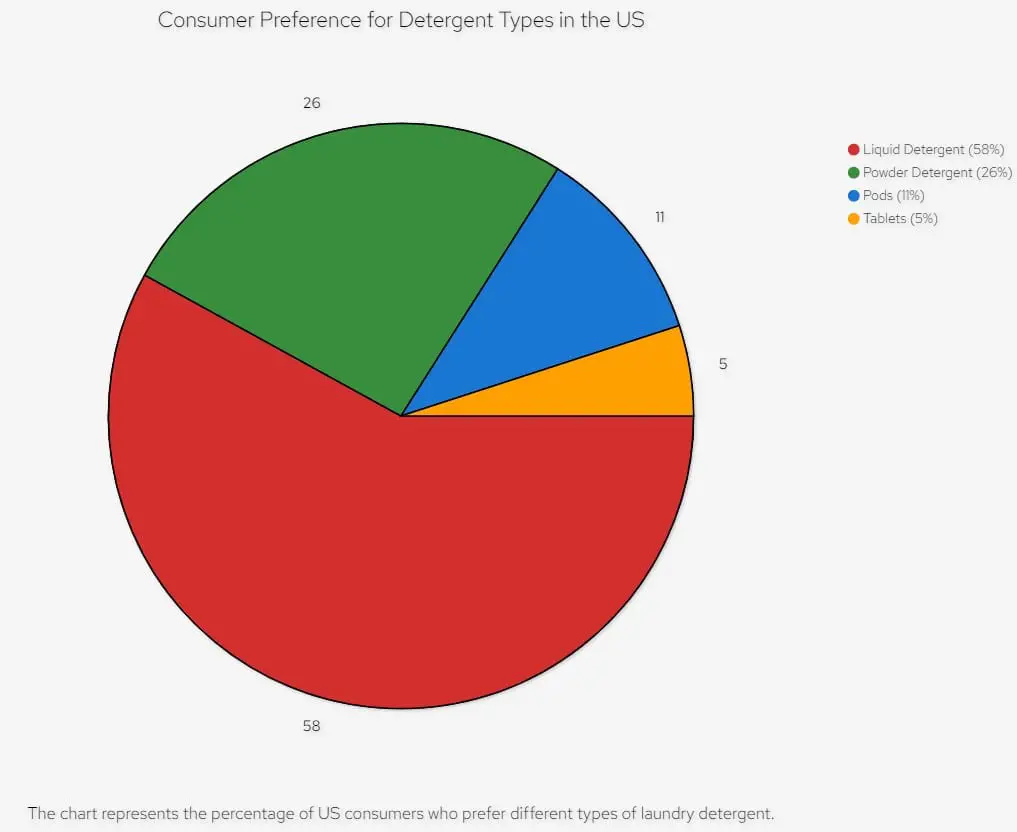
The above chart shows the detergent usage pattern of consumers in the United States.
- Liquid Detergent: 58%
- Powder Detergent: 26%
- Pods: 11%
- Tablets: 5%
What Do experts recommend?
Experts recommend evaluating the specific needs of your washing dirty laundry to guide your choice of detergent. For heavily soiled clothes, powder detergent is often favored, while liquid detergent excels at treating a variety of stains. Pods offer convenience for those seeking a pre-measured solution. Ultimately, making an informed decision involves balancing effectiveness, cost, and environmental considerations.
Which Type Of Laundry Detergent Is Better for Stains?
When dealing with stains, the effectiveness of powder and liquid detergents varies.
Liquid detergent’s composition allows it to penetrate deeply into fabrics, making it a preferred choice for treating a variety of stains, including oil stains and grease stains.
However, powder detergents often contain bleaches, which help whiten clothes and remove stains, making them a strong contender for heavily soiled clothes.
Evaluating the type of stain and fabric will guide your choice between liquid and powder detergent.
Here’s a quick chart that shows the effectiveness of Liquid vs. powder detergent on different types of stains as this should help to ease the decision-making process:
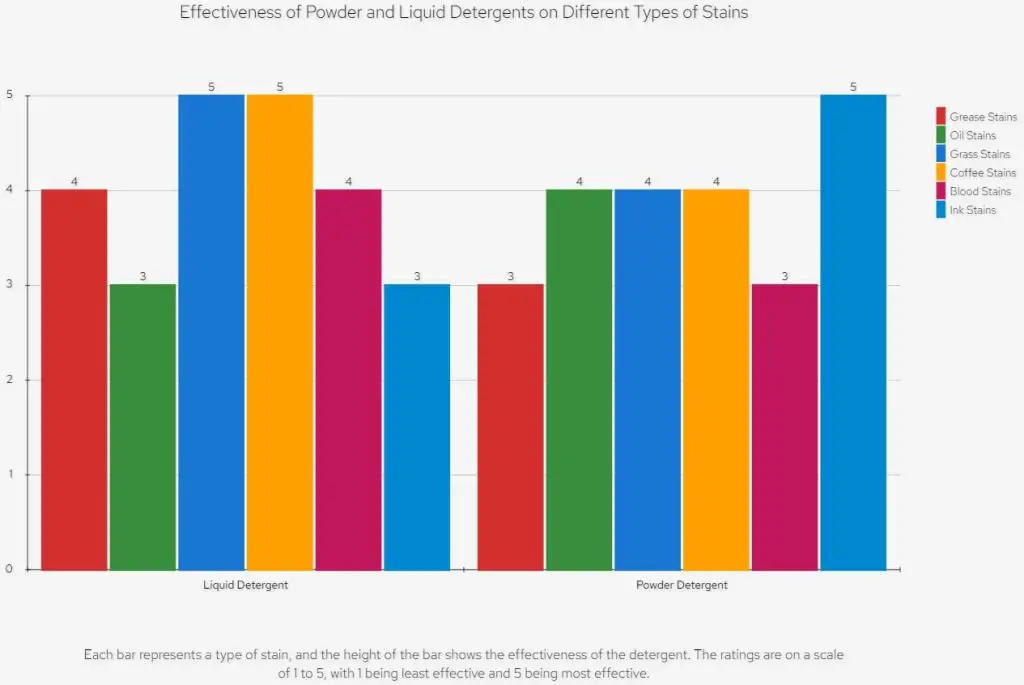
Note: Each bar represents a type of stain and the height of the bar shows the effectiveness of the detergent. The ratings are on a scale of 1 to 5, with 1 being least effective and 5 being most effective.
What’s More Budget Conscious: Powder or Liquid Detergent?
Analyzing the cost-effectiveness of detergents, powder detergent generally offers a more economical option compared to liquid detergent.
It is often less expensive per load and can be more effective for heavily soiled items, providing value for money.
However, the convenience and versatility of liquid detergents can justify the higher cost for some consumers.
Balancing your budget with your laundry needs will help you make a budget-conscious choice.
| Features | Powder Detergent | Liquid Detergent |
| Average Cost per Load | $0.08 to $0.40 | $0.21 to $0.50 |
| Effectiveness on Heavy Soils | High | Medium |
| Versatility in Water Temperatures | Medium | High |
| Environmental Impact | Less Plastic Waste | More Plastic Waste |
| Suitability for Sensitive Skin | Medium | High |
The table above can help visualize the comparative cost and effectiveness of powder and liquid.
Is Powder or Liquid Laundry Detergent Better for Your Septic System?
Both powder and liquid laundry detergents have different impacts on septic systems. It’s essential to consider the ingredients and opt for septic-safe detergents that are biodegradable and free of harmful chemicals, ensuring the longevity of your septic system.
Is Powder or Liquid Laundry Detergent Better for Hard Water?
Hard water presents challenges in washing laundry due to the presence of minerals. Powder detergents often contain builders that soften water, making them more effective in hard water conditions compared to liquid detergents. However, each situation is unique, and individual results may vary.
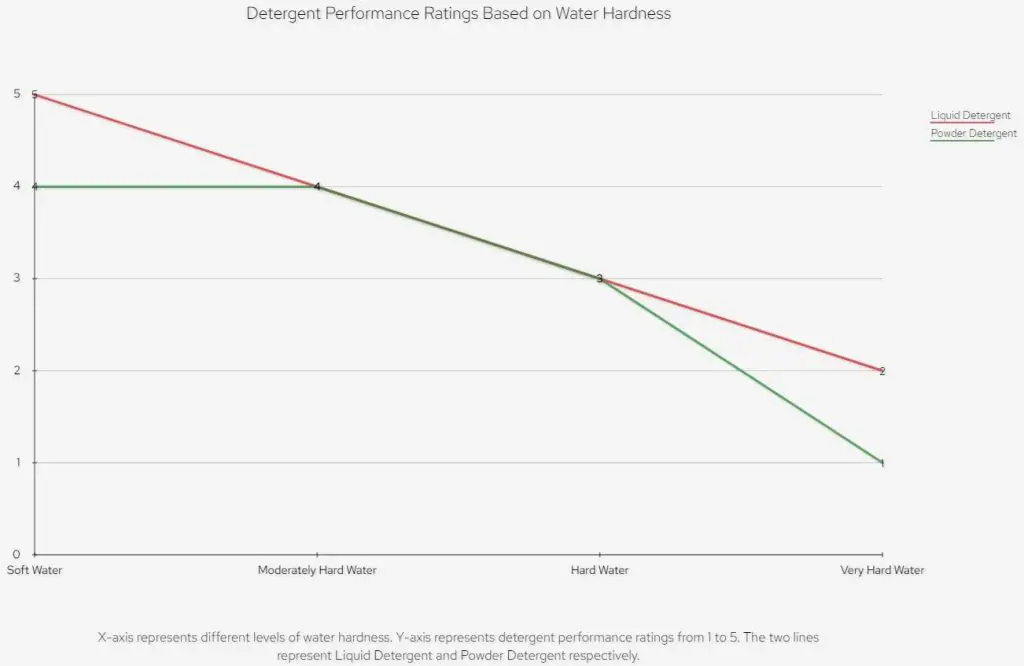
These data points simply suggest that liquid detergent generally performs better in very hard water conditions compared to powder detergent but shows a decreasing trend as water hardness increases.
On the other hand, powder detergent maintains consistent performance up to moderately hard water but sees a significant drop in very hard water conditions.
Here’s the water hardness range considered in the above graph:
- Soft Water: 0-60 mg/L
- Moderately Hard Water: 61-120 mg/L
- Hard Water: 121-180 mg/L
- Very Hard Water: >180 mg/L
Final Thoughts
Making your laundry routine smoother involves choosing the right laundry detergent, measuring carefully, and considering environmental and individual needs.
Whether you opt for powder, liquid, or pods, an informed choice will contribute to better cleaning results and longevity of your clothes and appliances.
Always prioritize your needs and environmental impact when selecting the ideal detergent for your washing needs.
You May Also Like
- Where to put liquid detergents in washing machine?
- Clean Your Washing Machine Detergent Drawer in 5 Mins
- What are Plant-based Detergents? (Explained)
- Can you use baking soda as laundry detergent?
- High Efficiency Laundry detergents: 11 Things Everyone should know
- Top Load Detergent VS Front Load Detergents (Which is best?)
- Can you use regular detergent in a portable washing machine?





